International Women's Day: Five ways to improve women's cycling
Cyclingnews offers some suggestions to improve the sport
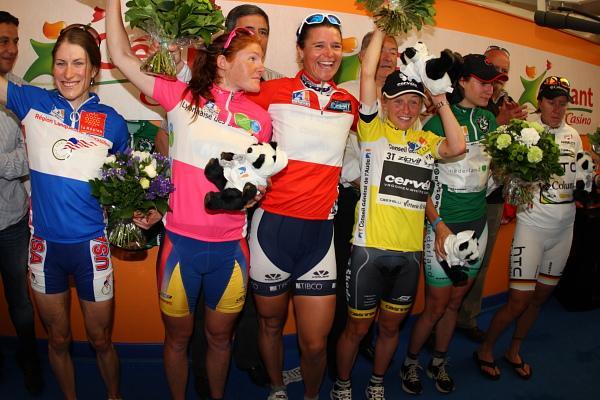
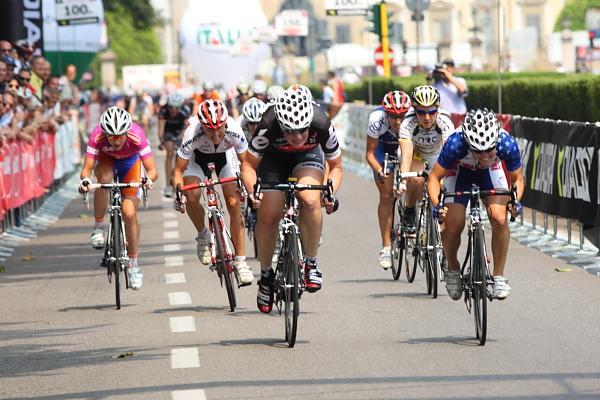
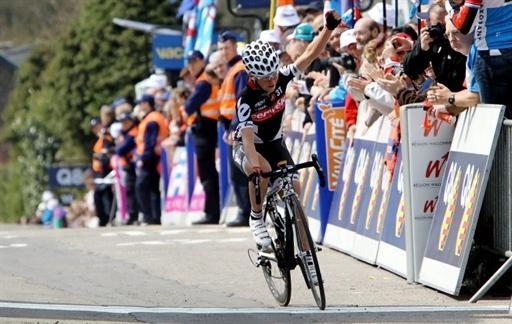
In light of International Women's Day, Cyclingnews explores five ways that the UCI and other organisations could help better the women's side competitive bike racing.
UCI should require top-level professional men's teams to develop women's programs
Women's cycling would benefit greatly from the support of established professional men's teams in much the same fashion as the current Under 23 development programs do. Under 23 teams such as Chipotle Development and Trek-LIVESTRONG thrive off of the relationships and support of their respective big brother ProTeams, Garmin-Cervelo and RadioShack.
There are currently a total of 172 elite men's teams registered with the UCI of which 18 are ProTeam, 23 are Professional Continental teams and 131 are Continental teams. There are currently only a total of 28 UCI elite women's teams.
"It should be a requirement for all men's ProTeam and Professional Continental teams to have an associated women's team and require all organisers to have a women's race as well as a men's race," said Rachel Heal, Directeur Sportif of the UCI Colavita-Forno D'Asolo Women's Pro Cycling Team. "The two main difficulties for the women are lack of teams and lack of races, so these requirements would help with those. Chances are they'd start out small, but in time may grow."
HTC-Highroad, owned by Bob Stapleton, has set an example by being one of the longest running and most successful professional level men's teams that also supports a professional women's program. Together, they have become one of the most winning teams garnering more than 300 victories.
Likewise, when ProTeam Garmin-Transitions formed a partnership with Cervelo SA, title sponsor for the former Cervelo Test Team, General Manager Jonathan Vaughters adopted the Cervelo Test Team women's outfit.
Get The Leadout Newsletter
The latest race content, interviews, features, reviews and expert buying guides, direct to your inbox!
The Diadora-Pasta Zara-Manhattan Women's Pro Cycling team is owned by Maurizio Fabretto and operated under the same infrastructure as the Professional Continental men's team Geox-TMC.
Other women's teams associated with professional men's squads are the pro teams Topsport Vlaanderen-2012-Ridley (Topsport Vlaanderen-Mercator), AA Drink-Leontien.nl and Abus Nutrixxion (Nutrixxion Sparkasse) and elite team Skil-Koga (Skil-Shimano).
On another note, the women's professional cycling teams that exist on their own work off of a far smaller annual budget than men's professional teams do. "There needs to be increased sponsorship and support for women's teams," said Lisa Hunt, Directeur Sportif of the UCI-registered TIBCO-To the Top Women's Pro Cycling Team.
"Female cyclists are a valuable marketing tool for sponsors. They're smart, outgoing and tremendous ambassadors for sponsors' products and services. I think women do more for their sponsors than men do. So we should be able to get more sponsorship dollars and support."
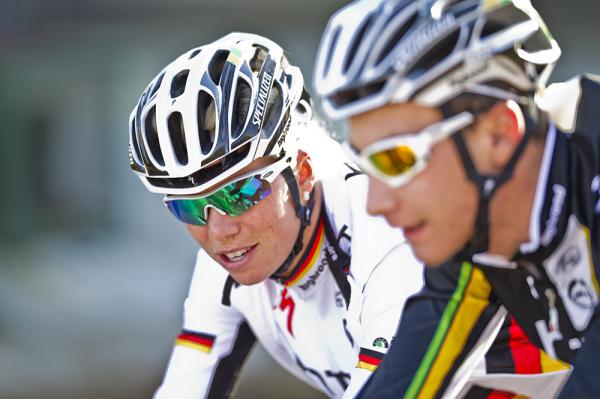
Require events to offer both men's and women's race
Cycling has been a part of the Olympic Games since 1896 and road cycling became a world championship event 1921, for men. Women's cycling didn't begin to take shape as a world championship event until 1958, where Luxembourg's Elsie Jacobs won the first championship title. The sport was added to the Olympic Games in 1984, and was won by American Connie Carpenter.
The Elite women's UCI World-Cup calendar currently has eight events beginning with the Trofeo Alfredo Binda - Comune di Cittiglio in Italy and concluding at the GP de Plouay-Bretagne in France and the UCI schedule includes a total of 76 events this year.
The UCI World-Cup series for Elite men was replaced by the ProTour in 2005. It is now called the UCI World Tour and includes 27 events from single day races to the world's most prominent stage races including the three Grand Tours; Giro d'Italia, Tour de France and the Vuelta a Espana. This year, there are roughly 528 events on the UCI Elite men's calendar world-wide.
Women's cycling has come a long way but it still has a long way to go. Developing the women's side of cycling could be helped by sport governing bodies such as the UCI by requiring organizers of elite men's events to also host a women's race.
Elite women's races are held in conjunction with top level men's events on only a handful of occasions. However, women's cycling could benefit greatly from organizers such as the Amaury Sports Organization (ASO) developing a women's event that would coincide with the Tour de France. ASO does do it's part, however, offering an elite women's event at the Ladies Tour of Qatar and La Fleche Wallonne Feminine, while organisers of the Tour of Flanders host a World Cup on parts of the same course covered by the men.
While these events are women's most prestigious events, the closest thing female professional road cyclists have to the Tour de France, the biggest and most well-known cycling race in the world, is the Tour de L'Aude Cycliste Feminine. Won by Great Britain's Emma Pooley in 2010, it is the longest running UCI event on the women's elite event calendar. But unless you are an avid fan of women's cycling, it is almost completely unheard of by the general public. It also ceased to exist this year, leaving the women's Giro d'Italia as the top race.
"ASO has shown dedication to women's cycling with the Ladies Tour of Qatar and Fleche Wallone, as have the organizers or Ronde Van Vlaanderen and many races in the US like Philadelphia, Redlands, Natures Valley," said HTC-Highroad's press agent Kristy Scrymgeour. "It's an excellent model, particularly when the races are on the same day and same course, as the crowd and media coverage is automatically there.
"Overall if more race organizers and teams take this model on more in the future, women's cycling will automatically grow. For sponsors who have stood behind a team and race that supports both men and women, the return and reach has been obvious."
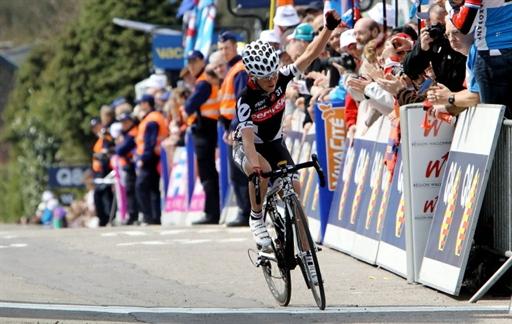
More and consistent media coverage for women athletes, teams and events
Professional sports is a business, whether its men's or women's programs, and sponsors want to see their brands in the media. Men's cycling is covered far more often than women's cycling in magazines, online and on television, and female athletes tend to be under-represented. If the media covered women's cycling on a more consistent basis, sponsors would be more inclined to support and fund women's cycling events, teams and athletes.
"Better media coverage would help," Heal said. "I read the live report of one of the recent Belgian Classics and despite a promise to try to include regular updates of what was happening in the women's race, there was not a single mention of it.
"It's kind of a vicious circle, there isn't enough money in women's cycling, so there are less teams and less races, but you aren't going to attract more sponsorship without more media coverage."
Scrymgeour echoed Heal's comments, saying, "In the last 10-15 years women's cycling has continually become more and more professional and the racing is definitely exciting to watch. The problem is that there is no-one to watch it as usually not broadcast. There is no easy solution to this as to be on TV you need sponsors, but to get sponsors you need to show TV coverage and ROI. It's a viscous circle."
Require equal prize payouts for money for men and women
Women currently make far less prize money than men do, in some cases more than 10 times less. Some would argue that the sport's governing body should enforce equal prize money for men and women. The debate surrounding whether or not women should receive equal prize money as their male counterparts fuels questions such as, do female athletes work as hard as male athletes and are they physically as strong or capable?
Should women race the equal distances in order to earn equal prize money? Should women be paid equal to men if the field sizes are smaller? Does the women's field have the same marketing power, or potential power, as the men's field has in attracting media attention and sponsorship dollars?
"Equal prize money - we deserve it," Hunt said. "We race hard, and the field sizes have grown tremendously. I think more promoters need to recognize this."
In 2007, mountain bike and cyclo-cross talent Georgia Gould (Team Luna) created an online petition to address the disparity between the UCI minimum prize money for men and women. The petition stated,
"We understand that because competition in the men's field is deeper, more places receive prize money. We do not understand why the women who are receiving prize money receive less than their male counterparts. Therefore we propose that the UCI show leadership and mandate equal prize money for the top five men and women. Article 3 of the UCI Constitution states: "The UCI will carry out its activities in compliance with the principles of: a) equality between all the members and all the athletes, license-holders and officials, without racial, political, religious, or other discrimination." We ask the UCI to honor its commitment to equality."
Gould's petition accumulated nearly 4,000 signatures and was submitted to the President of the UCI, Pat McQuaid, along with the Road, Mountain Bike and Cyclo-cross committees for review however, the sport governing body has yet to institute equal minimum prize purses.
Some race promoters have offered equal prize money, such as the Rick Geist, former promoter of the Tour de ‘Toona held in Altoona, Pennsylvania, where women were paid the same as their male counterparts. Several events that offered equal prize money for men and women last season included the TD Bank Mayor's Cup in Boston and in cyclo-cross at the US Grand Prix of Cyclo-cross (USGP), where the top three riders where paid equally and the former North American Cyclo-cross Trophy (NACT) series that offered equal prize money to the top five overall contenders.
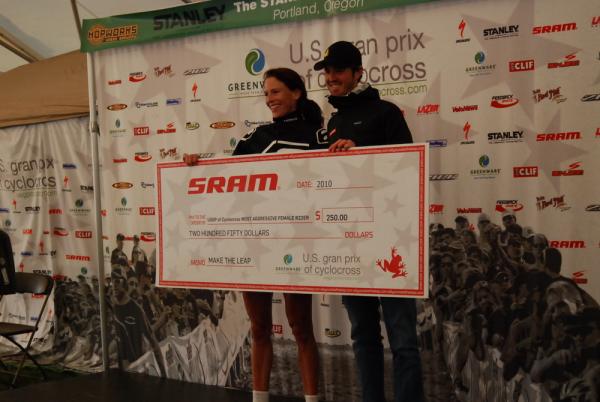
Better support for female cyclists working their way up the ranks from Juniors to Under 23 and Elites
Building a bigger, stronger and more talented women's cycling peloton doesn't have to start at the pro level. It should start with the junior women. Humans are social and cycling is a social sport. Whether that's racing to success with or in support of teammates or hanging out after the race sharing stories over a meal together, what makes racing fun is the shared memories - good and bad.
What keeps women racing as they mature from the junior to under 23 to elite ranks is making racing fun. That comes with strong friendships within the sport and strong relationships with mentors, often older women a few years ahead on the learning curve - women who can help the young riders figure out how to balance school, relationships and career choices.
Countless juniors come up through the ranks, collect junior national titles and then disappear from the cycling scene never to be heard from again. Sure, some women's interests change over time, but you have to wonder, how many of those women would have stayed in the sport of cycling if they had more fun and better support?
What if a young, talented cyclist wasn't the only woman (or person) racing in her school, city, county or region? What if she had teammates and regularly competed with and against other young women? What if she could seamlessly make the transition from cycling as a varsity sport in her high school to finding a niche racing and riding with others in her collegiate team to racing in the summers between semesters with a U23 development team and to being a member of a strong senior or elite women's team around the time she wrapped up her collegiate studies? She wouldn't have to, of course, but just think if those were options for her. More women might follow this path.
The good news is that there has been a lot of progress in the past two decades. Some mountain bike races now feature a women's Under 23 category - giving women another rung on the ladder instead of having them jump straight from the junior to elite ranks. The success of collegiate cycling, which combines the results of men's and women's racers and promotes the involvement of women is another success at many universities across the United States. Another is the growth of the National Interscholastic Cycling Association (NICA) which is supporting high school racing leagues in select parts of the United States, with more on the way.
Currently the UCI does not recognize the espoir category for women in road or cyclo-cross, leaving the top juniors to fight it out amongst far more experienced professionals at the start of their careers. As the sport grows, instituting a U23 category in these disciplines may help to keep more women in the sport.
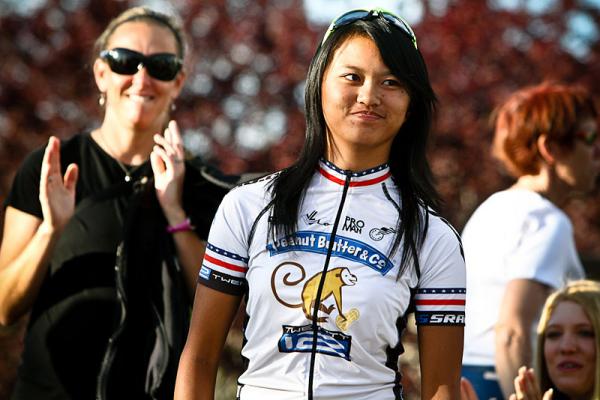

Kirsten Frattini is the Deputy Editor of Cyclingnews, overseeing the global racing content plan.
Kirsten has a background in Kinesiology and Health Science. She has been involved in cycling from the community and grassroots level to professional cycling's biggest races, reporting on the WorldTour, Spring Classics, Tours de France, World Championships and Olympic Games.
She began her sports journalism career with Cyclingnews as a North American Correspondent in 2006. In 2018, Kirsten became Women's Editor – overseeing the content strategy, race coverage and growth of women's professional cycling – before becoming Deputy Editor in 2023.